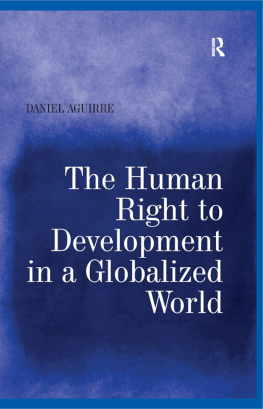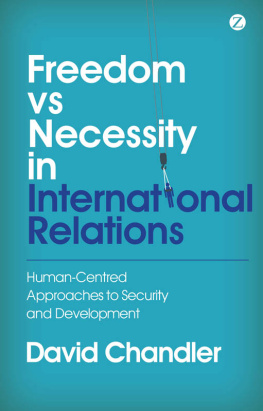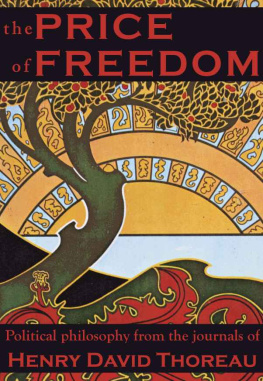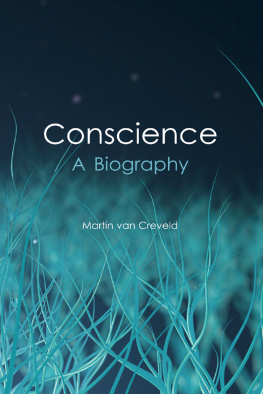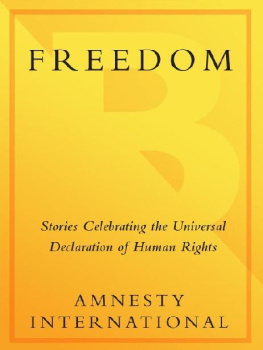The International Human Right to Freedom of Conscience
First published 2001 by Dartmouth Publishing Company and Ashgate Publishing
Reissued 2018 by Routledge
2 Park Square, Milton Park, Abingdon, Oxon OX14 4RN
711 Third Avenue, New York, NY 10017, USA
Routledge is an imprint of the Taylor & Francis Group, an informa business
Copyright Leonard M. Hammer 2001
All rights reserved. No part of this book may be reprinted or reproduced or utilised in any form or by any electronic, mechanical, or other means, now known or hereafter invented, including photocopying and recording, or in any information storage or retrieval system, without permission in writing from the publishers.
Notice:
Product or corporate names may be trademarks or registered trademarks, and are used only for identification and explanation without intent to infringe.
Publishers Note
The publisher has gone to great lengths to ensure the quality of this reprint but points out that some imperfections in the original copies may be apparent.
Disclaimer
The publisher has made every effort to trace copyright holders and welcomes correspondence from those they have been unable to contact.
A Library of Congress record exists under LC control number: 00054338
ISBN 13: 978-1-138-73429-6 (hbk)
ISBN 13: 978-1-315-18732-7 (ebk)
I have been fortunate to have had the assistance of a number of exceptional individuals while working on this book both in thesis form and in the present book form.
In particular, Michael Anderson, Director of Studies at the British Institute of International and Comparative Law, has been an outstanding advisor. His ideas and suggestions raised intriguing questions both for my current and future academic research. His wonderful nature and disposition served as a shining example of the proper manner in which a person in academia should conduct oneself.
Peter Slinn and Matthew Craven from the Department of Law in the University of London - SOAS offered quite welcome comments while this work was still in thesis form. David Nelken of the University of Cardiff provided the impetus to have the work published following a number of extensive post-doctorate revisions and additions.
Financial assistance mainly derived from the University of Londons Edmund Davis Postgraduate Fellowship Trust and the Lord Hailsham Fellowship.
On a personal note, I would not have been able to complete this book without the assistance of my spouse, Sandy, and my parents, Dr. David and Florence Hammer. My ongoing education derives from their efforts. My gratitude will always remain.
AfrCHR African [Banjul] Charter on Human and Peoples Rights
AmCHR American Convention on Human Rights
AmDHR American Declaration on Human Rights
CEDAW Convention on the Elimination of all Forms of Discrimination Against Women
CERD Committee to Eliminate Racial Discrimination
CHR Commission on Human Rights
CRC Convention on the Rights of the Child
Declaration Declaration on the Elimination of all Forms of Intolerance and Discrimination Based on Religion or Belief
ECHR European Convention for the Protection of Human Rights and Fundamental Freedoms
ECOSOC UN Economic and Social Council
GA UN General Assembly
Handbook Handbook on Procedures and Criteria for Determining Refugee Status
HRC Human Rights Committee
ICCPR International Covenant on Civil and Political Rights
ICESCR International Covenant on Economic, Social and Cultural Rights
ICJ International Court of Justice
ILO International Labour Organisation
Minorities Declaration Declaration on the Rights of Persons Belonging to National or Ethnic, Religious and Linguistic Minorities
Torture Convention Convention Against Torture and Other Cruel, Inhuman or Degrading Treatment or Punishment
UDHR Universal Declaration of Human Rights
UN United Nations
This is not a book about the human right to freedom of religion. There have been a number of recent books and articles of high quality that have addressed the right to freedom of religion in international human rights, These problems principally concern instances where the belief system either conflicts with another human right, such as the conflict between religious beliefs and the rights of women, presents an unavoidable conflict with inherent social values or the religion of the majority, or raises the universalism versus relativism debate given a limited interpretation of the right. While the literature has begun to address these issues, as have a variety of domestic and international decision making bodies, the analyses generally seem mired in these common pitfalls, partially due to epistemological approaches that simply cannot escape a pre-conceived understanding of religion and belief.
The key distinguishing factor then between this book and other works that have dealt with the right to freedom of religion is that it considers the manner in which the international human rights system addresses beliefs other than religious beliefs, or beliefs that are not necessarily of a religious nature, because of their inherent differences or manner of manifestation. The contention is that after accounting for the general difficulties noted above that the human rights system associates with the right to freedom of religion, it might do well to begin to consider the right from a broader perspective. One need not root the right in a religious framework or expressed as a conflict between the state and the religion. Upon considering the codification of the right to freedom of religion and belief in international human rights law, along with a select interpretation of the right in various international fora, it is apparent that the human right to freedom of religion incorporates a broad range of beliefs, including forms of belief that are not wholly analogous to a religious belief.
In particular, this book will consider issues like where do these alternative forms of beliefs fit in to the international human rights system, if at all? What significance does a conscientious belief for example have for a state espousing a particular religious doctrine that reflects the majoritys belief system? What role should beliefs that are not part of a religious system play in society and are they entitled to the same standing as a religious belief? What are the similarities and differences that the human rights system demands in providing protection to all forms of belief? Is it at all practical even to consider beliefs external to a formalised religious belief system given the difficulties in identifying such beliefs, the dangers associated with objective external bodies assessing such beliefs, and the possibility that individuals might attempt to take advantage of the right?
In a normative context, one may question whether the human rights system maintains room for other forms of beliefs that are different from the more familiar, doctrinal, religious systems. Do the principal international human rights treaties uphold alternative forms of religious beliefs even without any pre-determined or pre-directed mode of action deriving from the belief? What of belief systems that might be disengaged from some overarching ideals or ideas regarding the manner in which one is to conduct ones life? Alternatively, are all belief systems, religious or otherwise, entitled to the right to freedom of religion if they espouse discriminatory doctrine? What if a particular belief poses a threat to society or leads to an unfair distribution of resources due to the demands of the belief? The query is not only relevant for conflicting human rights, such as an inherently discriminatory belief system, but also applies to beliefs external to the accepted religious system that could lead to constitutive changes to the social structure.


